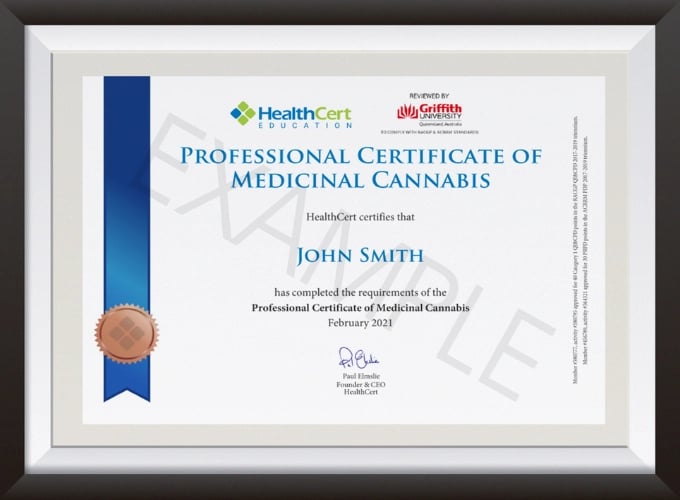Closing thin skin behind the knee can be tricky, but mastering deep sutures makes all the...
.jpg?height=200&name=HCE%20HubSpot%20blog%20images%20600x350%20(60).jpg)
Acquire the knowledge to safely apply plant-based therapy as a medicinal tool for patients with common ailments in primary care.

This evidence-backed, science-based online program teaches how and why plant-based therapies work, enabling you to provide holistic care and optimal outcomes for your patients.
- Learn about the endocannabinoid system and the properties of THC and CBD.
- Explore the routes of administration, side effects and contraindications of plant-based therapies.
- This course is for physicians, nurse practitioners, and degree-qualified nurses.
- CPD-accredited and university-reviewed.
Fulfils 50 hrs for medical professionals in Australia*
100% online
$1595
Special rates available
77.5 hrs
Self-paced
*provided an outcome measurement activity with a minimum of 5 hours is completed.

- Gain insights into plant-based therapy history and medical acceptance, and debunk preconceived ideas.
- Provide alternative treatment options for common chronic conditions and pain management.
- Support patients with anxiety, insomnia, autoimmune disorders, IBS, autism, diabetes, hypertension, skin conditions, respiratory conditions, and more using plant-based therapy.
- Improve the quality of life for cancer patients through symptomatic treatment methods.
- Explore the endocannabinoid system and understand the application of cannabinoids as well as their side effects and contraindications.
- Gain a plant-based therapy certification online with comprehensive CBD training that teaches how to improve patient outcomes with plant-based therapy, especially for patients with chronic health conditions.
Get unlimited access to all course content, additional learning materials, ongoing post-course support, and more.
NOTE: GPs working in Australia (except for in Tasmania) may prescribe plant-based therapies, however, as part of the guidelines of the Therapeutic Goods Administration Special Access Scheme-B, you will need to acknowledge that you have the knowledge necessary to do so. This program will equip you with the knowledge required to manage and prescribe plant-based therapy for various conditions and can serve as part of your documentation showing you have undertaken education in this field when you decide to become an authorised prescriber. More information here.
This module focuses on the history of plant-based therapy and medical acceptance. The module considers the cannabis plant and its colourful history as a psychotropic agent, a commodity, a sacred entity and a medicine to treat a raft of disorders. Maligned and criminalised in the second half of the 20th century, plant-based therapy is now in a new cycle with a burgeoning and sustained scientific interest in its potential medical uses. Cannabinoid chemistry and EndoCB signalling in cells are discussed and supported with diagrams. The legalisation of plant-based therapy across some countries and World Health Organisation (WHO) recommendations are included. The module concludes with plant-based therapy safety considerations.
This module focuses on the introduction to the endocannabinoid system. The module analyses the homeostatic endocannabinoid system and its broad scope of influence in both health and disease. The endocannabinoid system’s three central instruments are established, the endocannabinoids, receptors, and enzymes, followed by an analysis of the system’s homeostatic functions, including analgesia, mood, energy balance, and stress coping. Evidence for the relationship between insufficiency or dysregulation of the endocannabinoid system and particular disorders is also discussed. Finally, the module provides an overview of our current understanding of cannabinoids, such as THC and CBD, and how ongoing research into targeted manipulation of the endocannabinoid system with active cannabinergic compounds may prove therapeutic in numerous pathological conditions.
This module focuses on the major phytocannabinoids: THC and CBD. The module provides a comprehensive examination of the two main cannabinoids, tetrahydrocannabinol (THC) and cannabidiol (CBD). It distinguishes between their main actions and analyses their synergistic relationship. Chemical structures and how they work are explained. Various trial results are discussed and safety guides discussed. Given that THC and CBD interact differently within the endocannabinoid system and with other neurotransmitters, the module considers their different therapeutic potential.
This module focuses on routes of administration, side effects and contra indications. The module discusses the safe use of plant-based therapy, outlining the routes of administration, side effects, and contraindications. Cannabinoid pharmacokinetics are also examined, including its absorption following diverse administration routes, metabolism by different tissues and organs, bioavailability and elimination from the body. Despite its extreme safety as a medication generally and particularly relative to opioids, potential adverse effects and contrindicaitons of plant-based therapy are outlined. The module also analyses the potential for drug-to-drug interaction given CBD and THC’s effects on common biological pathways implicated in drug metabolism via their interactions with cytochrome P450 enzymes specifically.
This module focuses on patient cases and basic ailments. The module identifies a number of basic ailments that may be successfully treated with plant-based therapy in general practice. For example, the adverse effects of cancer treatment, the symptoms of chronic pain, anxiety, depression, and insomnia could be alleviated by plant-based therapy with mild side effects and minimal risk of toxicity or addiction. Providing that conventional treatments have failed or caused unacceptable side effects, a growing number of conditions lend themselves to treatment with plant-based therapy. Given the complex chemical profile, there is a single medication potential to assist with multiple symptoms, thereby reducing polypharmacy. The module applies an individualised management plan to three comprehensive case studies for patients with chronic pain, osteoarthritis, and anxiety and depression. Considerations ranging from the cost to the patient to the appropriate THC to CBD ratio are addressed. Finally, the module guides the practitioner in navigating an application for a TGA Special Access Scheme/SAS B.
This module focuses on using plant-based therapy for managing chronic pain. The module discusses the use of plant-based therapy as an emerging option for clinicians to reduce and alleviate difficult-to-treat, chronic, neuropathic pain. It includes analyses of the endocannabinoid system and the diverse, multimodal mechanisms of cannabinoid-induced analgesia. THC and CBD are an excellent additive treatment to concurrent conventional pain management for many chronic pain types associated with a range of diseases such as fibromyalgia, traumatic injury, and multiple sclerosis. For patients suffering from neuropathic pain, cannabinoids may be used successfully as an adjunctive, opioid-sparing, or ultimately a replacement therapy for managing their pain. The module also discusses a management plan’s necessary considerations such as determining dosages and accounting for safety considerations, and applies these protocols to a chronic pain case study.
This module focuses on anxiety, insomnia and depression. The module examines the homeostatic functions of the endocannabinoid system in relation to mood, stress response, and sleep. It also evaluates the therapeutic capacity of the major cannabinoids (THC and CBD), in isolation and in synergy, in relation to anxiety, depression, and insomnia. In developing a treatment plan, essential factors such as the interplay between depression, anxiety, pain, and insomnia are considered, as well as protocols for THC to CBD ratios in basic dosing, and the route and timing of administration with reference to each condition. With regard to treating insomnia particularly, the module addresses the role of other lesser-known cannabinoids, such as CBN, and terpenes. Pertinent considerations such as the dampening effect of CBD upon the undesirable effects of THC such as intoxication, tachycardia and psycho-activity (particularly important when treating anxiety) are also discussed.
This module focuses on cancer symptomatic treatment. The module reviews the myriad of functions of cannabinoids and the endocannabinoid system and considers the supportive role they may have to play in cancer therapy. Although research continues into the anti-tumour properties of cannabinoids, there is currently no evidence that plant-based therapy can cure or even treat cancer. Nonetheless, it can be a successful additional therapy used in the management of cancer symptoms and the iatrogenic effects of treatment. The judicious use of plant-based therapy can significantly improve cancer sufferers’ quality of life by managing persistent symptoms and side effects such as cancer pain, nausea, vomiting, and chemotherapy-induced nausea and vomiting. The module also considers the case studies of three different cancer patients and, for each, examines issues for the clinician related to assessment, dosing recommendations, formulation, methods of administration, and side effects.

Deputy Academic Director of the Lambert Initiative for Cannabinoid Therapeutics at the University of Sydney, Australia.
Professor Jonathon Arnold is a world leader in the science of cannabis and the cannabinoids. He is Deputy Academic Director of the Lambert Initiative for Cannabinoid Therapeutics at the University of Sydney, Australia. This is a cross faculty research initiative that specialises in the discovery and development of cannabis-based medicines. In 2018 he was one of four scientists selected to advise the World Health Organisation (WHO) on their historical review of cannabis and the cannabinoids.
Prof Arnold has over 20 years’ experience in cannabinoid pharmacology and has published extensively on the molecular, cellular, neurobiological and behavioural actions of the phytocannabinoids, cannabidiol (CBD) and tetrahydrocannabinol (THC). Since 2016 he and his team have conducted epilepsy research to improve the understanding of the anticonvulsant properties of the phytocannabinoids. He recently published a high-profile paper which shed new light on the mode of action of CBD in the treatment of childhood epilepsy (Altmetric 75). This paper received the Epilepsia Brain Science Prize honouring the most significant advance in knowledge in the field of epilepsy in 2019.

.png?width=143&height=143&name=Joe%20Kosterich%20(3).png)

$1595
*provided an outcome measurement activity with a minimum of 5 hours is completed.
Bundle two courses and save 5%, or three courses and save 10% upon enrolment.
Talk to us about deferred payment options, registrar scholarships and special rates.
*For Australian residents only: Online course prices are shown exclusive of GST. If you are GST-registered, please enter a valid ABN at checkout to ensure GST is not applied. Otherwise, 10% GST will be added at checkout. View our FAQ for more information.


HealthCert courses have become the standard by which you gauge all others.
Dr K. Abolarinwa
Good courses with excellent speakers. I particularly enjoyed the case study scenarios which helped to integrate the knowledge gained.
Dr A. Tucker
This is the pathway to improve your confidence and evolve into the GP you aspire to be.
Dr S. Shinwari
| RACGP Activity Number | ACRRM Activity Number | Activity Title | Education Hours | Performance Hours | Outcome Hours | ||
|---|---|---|---|---|---|---|---|
| 411966 | 38342 | Introduction to the Endocannabinoid System | 411966 | 38342 | 4 | 5 | 0 |
| 411963 | 38340 | History of Plant-Based Therapy and Medical Acceptance | 411963 | 38340 | 4 | 5 | 0 |
| 414131 | 38364 | Anxiety, Insomnia and Depression | 414131 | 38364 | 4 | 6 | 0 |
| 411977 | 38362 | Patient Cases and Basic Ailments | 411977 | 38362 | 4.5 | 6 | 0 |
| 411989 | 38365 | Cancer: Symptomatic Treatment | 411989 | 38365 | 4 | 6 | 0 |
| 414126 | 38354 | Routes of Administration, Side Effects and Contra Indications | 414126 | 38354 | 4 | 6 | 0 |
| 411982 | 38363 | Chronic Pain and Plant-Based Therapy | 411982 | 38363 | 4 | 6 | 0 |
| 411970 | 38351 | Exploring THC and CBD | 411970 | 38351 | 4 | 5 | 0 |
| 801807 | 38366 | Plant-Based Therapy and Chronic Pain Outcome Improvement Activity | 801807 | 38366 | 0 | 0 | 8.5 |
| Total hours | 32.5 | 45 | 8.5 | ||||
View the CPD Hours for all HealthCert Education activities.
The purpose of outcome measurement activities is to improve your clinical confidence in managing an identified learning gap. Outcome measurement activities are not a requirement of our Professional Certificate of Advanced Certificate courses; they are a requirement for Australian CPD purposes.
HealthCert Education provides a variety of outcome measurements activities to suit your needs:
This Professional Certificate of Medicinal Cannabis is suitable for physicians, nurse practitioners, and degree-qualified nurses. There are no prerequisites.
Participants do not have to pass an IELTS test but, as the courses are delivered in English, proficiency in listening, reading and writing English is assumed.
Participants will require access to a computer/laptop, an internet connection and a basic level of technology proficiency to access and navigate the online learning portal.
This certificate course meets the minimum 50 hours CPD annual requirement across all three mandatory CPD activity types, provided an outcome measurement activity with a minimum of five hours is completed. You may use an optional HealthCert outcome measurement activity or develop your own.
Outcome measurement activities are not a requirement of Professional or Advanced Certificates.
Upon successful completion of the exam, course participants will receive a Professional Certificate of Medicinal Cannabis and CPD hours.
This certificate course:
To learn more about the delivery of certificates in Australia and overseas, please visit our FAQs.
Professional Diploma Pathway
This course is the first stage of the three-part Professional Diploma of Medicinal Cannabis. The education pathway is Professional Certificate of Medicinal Cannabis, Advanced Certificate of Medicinal Cannabis and Professional Diploma of Medicinal Cannabis.
GPs working in Australia (except for in Tasmania) may prescribe plant-based therapy, however, as part of the guidelines of the TGA SAS-B, you will need to indicate that you have the knowledge necessary to do so. This program will equip you with the knowledge required to manage and prescribe plant-based therapy for various conditions and can serve as part of your documentation showing that you have undertaken education in this field when you decide to become an authorised prescriber. More information here.
This organisation is an RACGP-accredited CPD provider under the RACGP CPD Program.





Don't see your question? Explore other faqs or talk to us.
Fees will vary based on the program and study option selected (fully online vs online + optional practical workshop). Payments can be made upfront or in monthly instalments. Special rates and various payment options are available. GP registrars and doctors in training enjoy a scholarship of up to $500. Talk to us to learn more.
Completion of any HealthCert course or attendance at an event will enable you to access the HealthCert Alumni Program which includes:
HealthCert Education is pleased to issue digital credentials for alumni. Digital credentials are a permanent online record of your successful completion of a HealthCert course and are issued to all course participants in addition to PDF certificates. If you are based in Australia, you also have the option to order a hard copy of your digital certificate for a small additional fee.
The recommended study duration of this certificate course is 77.5 hours, which includes study of the pre-course activities and readings, online lectures, live tutorials, and online assessment. This self-paced course offers the flexibility of 100% online study in your own time, at your own pace, in your own home or office, with no mandatory face-to-face requirements. You are not required to be online at specific times but can view and replay video lectures at your convenience.
All HealthCert courses meet World Federation of Medical Education standards. This certificate course qualifies for CPD hours from the Royal Australian College of General Practitioners (RACGP) and the Australian College of Rural and Remote Medicine (ACRRM) in Australia. If you live or work outside Australia, please contact us on admin@healthcert.com to discuss whether this course can be recognised in your country.
Want to stay up-to-date with the latest case studies, podcasts, free video tutorials and medical research articles pertinent to primary care?
Our Education Advisors can assist you with any queries and tailor our education pathway to suit your current expertise, interests and career goals.